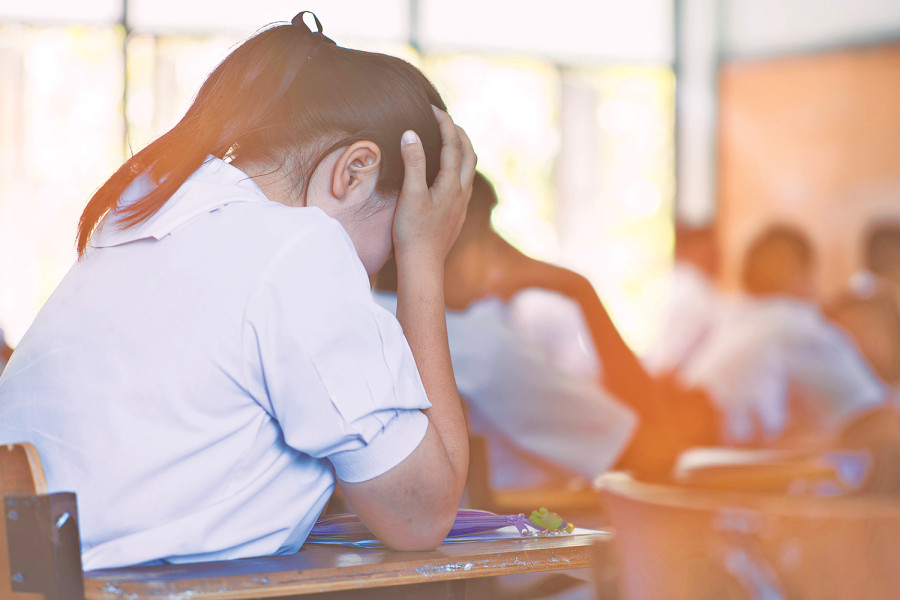National
Need for counselling as students complain of rigid school rules
Students and mental health facilitators believe that regular school counselling can go a long way in creating a healthy learning environment.
Manushree Mahat
Kenisha Thapa could have avoided two years of mental and emotional anguish. She finished her 10th grade in Kavya School, and up until then, her days knew little trouble as her school was unbelievably liberal. Her teachers didn’t harp on her about grades, and were empathetic to students’ concerns. Life was good.
When she began her +2 at a different school, however, hell broke loose.
At her new school, students were not allowed to change their once chosen seats from their first day. Thapa enjoyed her time with her classmates, but there she could barely interact with anyone beyond the two people she first met. Her school had a number of senseless rules—the bathrooms had no mirrors because, according to the school, students should spend all their time studying, not grooming themselves.
In a traumatising incident one day, she was called out in the middle of her high school grounds for merely talking to a guy friend.
“They told me that the way I was talking to a guy friend was ‘unethical’,” said Thapa. “My high school teachers had no idea of what constitutes a healthy environment at schools. Mental health concerns were the least of their priorities.”
In many sociological definitions, schools where children spend the most of their early life, are social institutions that cater to the needs of society by churning out adults who can maintain social harmony, and facilitate social growth.
Research shows that adolescence is a vulnerable time when it comes to mental health, mainly due to the profound physical and mental changes that mark this age.
School counsellors perform a multitude of roles for students—from tackling academic issues, to psychosocial and emotional support, as well as other mental health concerns.
According to the National Health Survey 2022, 13 percent of women of age 14-19 years, and seven percent of the same age group suffer from anxiety. Within the same age group, four percent women, and one percent men have some form of depression.
School students and mental health counsellors alike believe that regular school counselling can go a long way in creating a healthy environment at schools.
Madhu Bilash Khanal has over a decade of experience as a school counsellor. He believes that a school can explore a student’s fullest potential only by providing psychological counselling. Schools should make efforts to understand their students’ feelings and struggles and help them solve the problems.
“It is vital that every school incorporates counselling to bring out the best in their students,” Khanal says.
In western countries, school mental health screening tests are also beginning to gain traction. These tests not only highlight psychological problems, but also serve as a preventative tool for students at risk of developing severe mental health problems.
Khanal states that a major role of school counsellors is also to recognise and refer students with severe psychological problems to hospitals and psychiatric facilities.
A research conducted in 2020 on Nepali teachers’ awareness on the mental well-being of students showed that a significant number of teachers were aware of the emotional and mental health issues of their students. While 10 percent of the teachers had no idea about the issues of their students, a whopping 70 percent were able to identify somatic problems like tiredness, attention problems and 50 percent of the teachers could recognise mental health problems like being sad, bullied, and various speech problems.
Prakriti Pourel, a learning support counsellor at The British School, Kathmandu, shares that school counsellors play a crucial role in creating a safe environment at schools for optimal education. She states that school counselling is a combination of an understanding between teachers, students, as well as parents, to promote the overall mental well-being of a child.
“We, as counsellors, coordinate with teachers to better understand the emotional well-being of a student. If there’s something that a teacher does that affects students emotionally, we ask them to stop,” says Pourel.
Teachers do take a long time to grasp the full extent of mental well-being of students, says Khanal.
“A lot of teachers take mental health lightly. We take time to train teachers that schools are not just about studying. They should also understand students well, and equip them with skills that help them throughout life,” Khanal says.
Thapa, the student, also sees lack of understanding on the teachers’ part as a reason for her emotional distress.
“Teachers at my school didn’t know how to handle these issues privately. First of all, there’s nothing wrong with talking to a boy in my class, and teachers should know that. And there was no need to call me out in front of the entire school like that,” says Thapa.
Often, children suffering from bad academics have hidden family problems. Inability to concentrate at schools, engaging in risky behaviours, poor attendance—they can be the result of deep-rooted personal and family problems.
“School counselling also addresses familial issues, and this involves directly engaging parents in counselling,” Khanal says. “To ensure the best for students, bringing in the parents, and teachers, to counselling is the key to holistic growth of the students.”
A research conducted in Kailali district revealed that students from poor economic backgrounds also have poor academic records. This was because such parents worry about employment more than their children’s education. This eventually results in the students seeking low paying jobs in the labour market.
School counselling may play an important role to avoid this vicious cycle of poverty. Many private schools in the country now employ school counsellors who can cater to the middle- and upper-middle class students. But as students from poor economic backgrounds could be facing even more stress, providing school counsellors in community and government schools, as well as the rural areas of the country is vital.
Khanal, who engages in programmes with community and government schools, with the Centre for Mental Health and Counselling-Nepal (CMC), shares that the government should prioritise catering to the mental health of less-privileged students.
Sambhavya Foundation, a non-profit organisation, has been working with several government schools to incorporate counselling for students, along with teachers, and parents.
On April 29, the Kathmandu Metropolitan City began psychosocial counselling-related training in community schools.
Khadka Bahadur Basnet, central committee member of N-PABSON, an umbrella organisation of private schools, agrees that counselling in schools is necessary. He finds faults in the age-old system of rote learning that only tests students’ ability to memorise the texts, instead of truly understanding them.
“That leads students to frustration and to give up on their studies. The only way to bring out the best in students, while also training the teachers to understand students, is counselling,” said Basnet. “Instead of punishing the students, it's vital to understand them. For this, counselling is absolutely necessary.”
Students that the Post talked to said there is often a hesitancy on their part to seek counselling. At times, they choose to keep it to themselves for a while.
Many students may take time to open up fully, especially while deciding to take one-on-one sessions. Pourel, , the learning support counsellor, shares her observation that as opposed to girls, boys are much less forthcoming on their issues, and almost never approach mental health counsellors on their own.
Despite this, students that the Post talked to agreed that accessible counselling would benefit both their psychological and academic lives.
A study conducted in Kenya also revealed that a significant amount of students felt positive changes and satisfaction following school counselling. Around 74.3 percent of students showed academic improvement, and 80 percent of students expressed a positive student life in the aftermath of psychosocial school counselling.
“If children are told at a young age that it’s okay to ask for help, they will feel heard and healed starting from a vulnerable age. This will significantly improve their mental health in the future,” says Pourel.




 11.12°C Kathmandu
11.12°C Kathmandu














